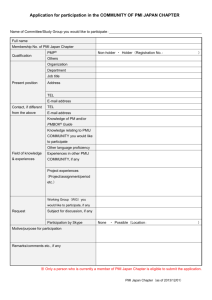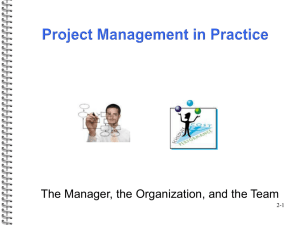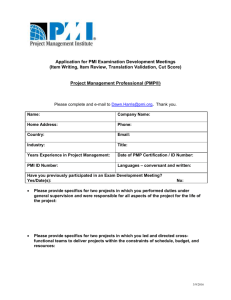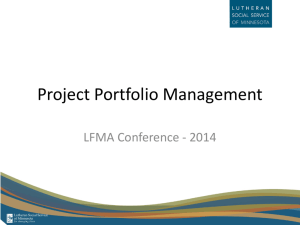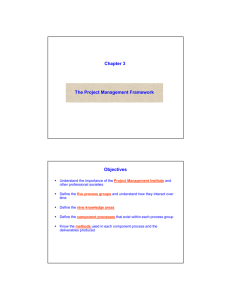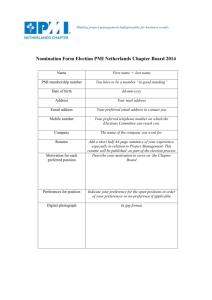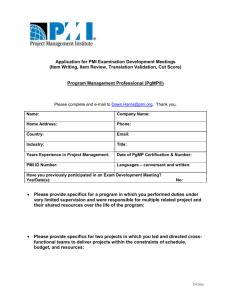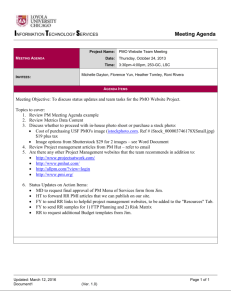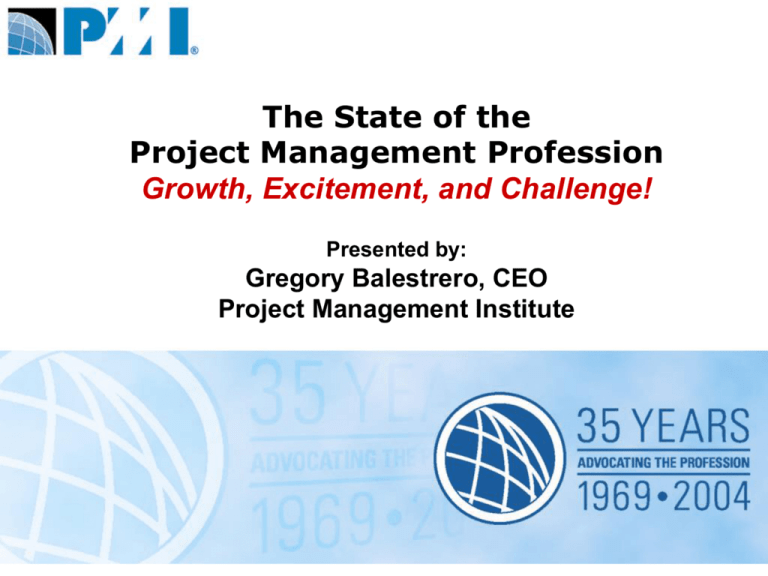
The State of the
Project Management Profession
Growth, Excitement, and Challenge!
Presented by:
Gregory Balestrero, CEO
Project Management Institute
“His real expertise is making
sure we execute well.”
Louis Gerstner outgoing CEO, IBM,
describing his replacement, Samuel
Palmisano.
Execution is . . .
• a discipline, and integral to strategy.
• the major job of the business leader.
• must be a core element of an
organization’s culture.
From Execution, The Discipline of Getting Things Done,
Larry Bossidy and Ram Charan, pg.21.
Execution is . . . .
• All about Mature,
Enterprise-Wide, Project
Management.
The Most Important Benefit of Project
Management for the Organization:
IMPROVED ABILITY TO
EXECUTE STRATEGY!
So, the questions that come
to mind are…
• What level of acceptance
is PM receiving in
organizations?
• How and to what level
are organizations
realizing the benefits of
PM?
• What is the potential for
growth for the
application and
profession of PM?
• What are the challenges
and changes facing PM?
Let Us Study the First
Question…
What is the Level of Acceptance
for PM in Organizations?
Project Management Application
in Organizations
•
Financial support for professional
memberships, education and certification
•
Formal career paths (Microsoft, GSA, etc)
•
Established corporate-wide methodologies
•
Application of relevant software
•
Focus on improving maturity
Acceptance of Project Management:
Rate of Introduction
When was project management first
introduced to your organization?
<3
years
35%
Over a third of those
Don't
know
7%
>10 yrs
21%
4 to 10
yrs
37%
who use project
management say that it
was introduced in their
company within the past 3
years.
2003 Project Management World
Study, University of Bremen, PMI,
and others
Acceptance of Project Management:
Growth in Importance
Has the importance of project management for
your organization increased over recent years?
A lot
70%
Very
Somewhat
lit t le/None
26%
4%
Of those using project
management, the large
majority say that the
importance of project
management has increased
substantially within their
organizations over the last
few years.
2003 Project Management World Study,
University of Bremen, PMI, and others
Application of Project Management:
Recognition in Other Activities
Project management covers all business aspects…
(Which areas of your organization use project management?)
IT
86%
64%
Organization/Planning
56%
HR/Personnel
Research and
Development
Finance/Acct.
Sales/Marketing
47%
45%
44%
While IT professionals
are still the heaviest
users, other key
business functions are
using it also.
2003 Project Management World
Study, University of Bremen,
PMI, and others
Acceptance of Project Management:
Information Technology Recognition
Highest paying IT certifications
(Premium Pay as a Percent of Base Pay)
16%
PMP
C ertified IS
Security
Professional
Oracle C ertified
Professional
C isco C ertified
Network
Professional
Microsoft
C ertified Db
Administrator
11%
11%
10%
10%
PMI’s Project Management
Professional (PMP®)
certification is the most valued
certification in the IT field
2003 Foote Partners LLC – Certifications
Pay Index
Acceptance of Project Management:
Premium Pay for Certifications
Premiums paid during past two years
General
-34.5%
Apps Development/Prog. Language
Database
Webmaster/Internet
Networking
-9.4%
-25.3%
-13.3%
System Admin & Eng/Network OS
-5.4%
Security
15.8%
Project Management
-50%
Project
management
certification
shows greatest
growth in
premium pay
during past two
years
-13.1%
23.1%
-30%
-10%
10%
Percent Change
30%
50%
2003 Foote Partners LLC
– Certifications Pay Index
Let’s Look at the Next
Question…
How and to what level are
organizations realizing the benefits
of Project Management?
Evidence of Improvements in
Management of Projects
Categories
Project time overruns (over
original estimate)
Project cost overruns
1994
222%
2003
63%
189%
49%
Project success rate (on time,
on budget, within scope)
Failed
16%
28%
31%
23%
Standish Group International – CHAOS Chronicles, 2001
(Findings from the study of 30,000 IT projects)
Keys to More Successful Projects:
Organizational Structure
1980s research on project performance in
relation to organizational structure
• More projectized is better
• 100% gain from project-based organization
versus functional organization
• Gains along entire organizational matrix
continuum from functional to fully projectized
Proving the Profits, Bud Baker, PM Network® Magazine, December
2000, 19; The Barriers Affecting Project Success, Erik Larson and
David Gobelli, PMI Seminars & Symposium Proceedings, 1986
Keys to More Successful Projects:
Quantifying the Value of Project
Management
Companies that are more mature in project
management have:
-Better project performance (estimating accuracy)
• Less mature – miss budget by 20%
• Less mature – miss schedule by 40%
-Better cost/schedule predictability (precision) and
lower project management direct costs
W.Ibbs, J.Reginato, Quantifying the Value of Project Management, PMI 2002
Keys to More Successful Projects:
Top Project Success Factors
1. User (customer) involvement
2. Executive support
–
Shows increasing demand from the top
3. Experienced project manager
Standish Group International – CHAOS Chronicles, 2001
(Findings from the study of 30,000 IT projects)
Keys to More Successful Projects:
Value of Project Management Offices
Project management offices (PMOs) can
provide beneficial financial impact
•
•
•
•
Provide standard methodology for managing
projects
Have responsibility for process and project reporting
and tracking
Ensure that similar projects are executed in a similar
way
Have information needed to speed up or slow down
a process
2003 PMO Survey by PMI and CIO Magazine
Keys to More Successful Projects:
Mature Project Management Offices
Percentage of PMO’s that report
increased project success
65%
37%
1 year old
PMOs
5 year old
PMOs
The age of a PMO has an
increasing effect on project
success improvement.
Furthermore, the longer a
PMO is in existence, the
more likely the company will
track project success.
2003 PMO Survey by PMI and CIO
Magazine
Now for the Next Question…
What is the potential for growth for
both the application and profession
of Project Management?
Dimensions of a Project
Management Profession
PMI estimates…
•
4.5 million potential
U.S. practitioners
•
16.5 million potential
global practitioners
•
$10 trillion (U.S.) spent
globally on projects
yearly
Interest in Project Management:
PMI Membership Growth Since 1980
80,000
60,000
40,000
20,000
0
19
80
19
82
19
84
19
86
19
88
19
90
19
92
19
94
19
96
19
98
20
00
20
02
20
04
PMI Members
100,000
43,101
54,998
70,035
120,000
123,000
140,000
Projected membership at end of
2004 is 150,000
86,698
99,483
160,000
Compared to the Rate of
Introduction of Project Management
When was project management first
introduced to your organization?
<3
years
35%
Over a third of those who
Don't
know
7%
>10 yrs
21%
use project management say
that it was introduced in their
company within the past three
years.
4 to 10
yrs
37%
2003 Project Management World Study,
University of Bremen, PMI, and others
Interest in Project Management:
Impact by Economy
PMI U.S. membership versus U.S. Gross
Domestic Product
6%
45%
U.S. GDP Growth
PMI Membership Growth
U.S. GDP Growth
4.3%
40%
35%
4%
30%
22.9%
3%
25%
20%
2%
15%
10%
1%
5%
0%
1986
0%
1988
1990
1992
1994
1996
1998
2000
2002
2004
PMI Membership Growth
5%
50%
PMI growth
continues
even during
economic
downturns
since 1992
PMI membership growth
in Canada
1993
2000
2004*
1,469
7,585
13,406
*As of 31 July 2004
Interest in Project Management:
Growth in PMI PMP Certification
75,000
65,000
Total PMPs
55,000
45,000
35,000
25,000
15,000
5,000
1998
1999
2000
2001
2002
2003 Oct.
PMP® is a registered mark of the Project Management Institute
Interest in Project Management:
Growth in PMP Certification in Canada
8,000
7,000
6261
6,000
PMPs in Canada
5,000
4443
4,000
3430
3,000
2329
1589
2,000
1,000
534 613 666
377
242
999
0
1993
1995
1997
1999
2001
2003
Future Acceptance of Project
Management
Do you believe that greater/less use of
project management will become necessary
in your organization in the future?
A lot
more
40%
Over 85% feel that
project management
will become more
necessary in the
future.
Less
0%
The
same
13%
More
47%
2003 Project Management World
Study, University of Bremen,
PMI, and others
And Finally…
What are the challenges and
changes facing Project
Management in the future?
Project Management:
The Challenges
•
•
•
•
•
•
Senior executive recognition and valuing
organizational maturity improvement
Acceptance of project management as a
cross-industry management capability rather
than an industry-specific technical capability
Increased capability of project personnel
Case studies describing success
Quantitative data demonstrating success
Subjects of Research Interest in
Project Management
Top Five Areas of Research Interest
Selling project management to senior executives
36%
Linkage to strategic planning
34%
Virtual teams
31%
Quantitative value of project management
29%
Program and portfolio management
24 %
PMI Technical Needs Assessment, 2002
Acceptance of Project Management:
Emerging Needs
The future is already occurring
(What will be important in five years?)
Percent of Respondents Rating
Item As Extremely Important
Leadership
71
People skills
61
Program management
43
Virtual project management
36
Knowledge management
32
PMI Technical Needs Assessment, 2002
A question of relevance…
How is PMI helping Project
Management realize its potential?
The Answer…
By Being the Global
Advocate for the Project
Management Profession
Long Term Goal
10–30 Years into the Future
Worldwide, organizations will embrace,
value and utilize project management
and attribute their success to it.
PMI Strategic Goals
• Superior Practice of
Project Management
• Global Acceptance of
Project Management
Strategic Themes
• Thought
Leadership
• Profession
Enablers
• Partnering
• Advocacy
Thought Leadership
• PMBOK® Guide – Third Edition
– Translations in 12 languages
• Practice Standard for Earned Value Management
• Program Management and Portfolio Management
Standards
– Standards development team concluded that we will produce
a separate standard for Program Management and Portfolio
Management
Thought Leadership
• “Value of Project Management” Research
– Baseline executive survey
– Quantitative research on the value of project management
• Third Biennial Research Conference
– London, United Kingdom – July 2004
• Market Research on Specialist Roles
– Roles of individuals supporting project managers
• Updating CAPM™ Credential
- Revised CAPM will be available 31 December 2004
Profession Enablers
• Organizational Project Management
Maturity Model (OPM3®)
• Role Delineation Study for Project
Management Professionals
• Certification translation activities
-Updating translations in nine languages
PMP® is a registered mark of the Project Management Institute
Profession Enablers
• Integrated initiative related to career development
framework
• Registered Education Provider (R.E.P.) Program
enhancements
– Rigorous review of all existing and new providers
– Reviews conducted on three-year cycle
• Launch mini-conference based on
SeminarsWorld®
– 28 unique seminars offered at one location
– Two similar mini-conferences in 2005; three in 2006
Partnering
• Status and Trends of Project Management World
Study (w/University of Bremen)
– Variation in Maturity across industry sectors
– Uniformity of training, executive commitment, etc.
• Joint Research in w/APM
– Addressing cultural differences on project teams
– Global study
• Human Side of Project Management
– Leadership skills
– Eastern vs. Western Culture
• Global Branding of PM Profession (w/IPMA)
Advocacy
• Expanded and enhanced communications
plan
• U.S. Federal Project Management Working
Group
• Expanded EU activities
• Executive forums with PMI Components,
business and government
PMI outreach initiatives in Canada
• Work with Canadian government on adoption of
project management processes and procedures
• Expand business and government relationships
with the assistance of PMI Components in
Canada
• Expand existing contacts with business and
industry associations
• Promote the adoption of PMI Standards and
Certification
Agenda for Change
Bringing extraordinary service,
leadership to PMI
Internal Capabilities
Make PMI a Member/Customer
Centric Organization
–
–
–
–
Launch Key Determinants of Satisfaction Study
Create Customer Care and Technology Operating Group
Accelerate opening of Asia Pacific Service Centre
Create integrated processes for access, service and
delivery of PMI’s programs products and services
– Develop and track satisfaction metrics based on Key
Determinants Study
– Design technology based on member/customer needs
Internal Capabilities
Make Market and Business Development
a Strategic Competency
– Created Market and Business Development Operating
Group
– Integrate PMI research and development
– Develop processes for scanning, surveying, information
gathering, interpretation and development
– Develop integrated product development cycles
Internal Capabilities
Make Leadership
a Strategic Competency
• Global volunteer leadership development
initiative
• Design and implement staff leadership program
We are convinced that…
•
Project management is advancing
•
Professional recognition is increasing
•
Demand for professional development is
increasing
•
Organizational PM maturity is improving
•
Financial reward is increasing for those in PM
•
Applied knowledge is being created and
shared
In closing, I am reminded of a
description of visions and the future..
The Future is already here…it is just
unevenly distributed.
Seth Kahan,
Thought Leader, Community
Development
Join PMI in ensuring that…
Worldwide, organizations embrace,
value and utilize project management
and attribute their success to it.
®
Projec
© 2003 Project Management Institute, Inc. All rights reserved. 070-021-2003 (rev. 03-03)
“PMI” and the PMI logo are service and trademarks registered in the United States and other nations; “PMP” and the PMP logo are certification marks registered in the United States and other nations;
“PMBOK”, PM Network”, and “PMI Today” are trademarks registered in the United States and other nations; and “Project Management Journal” and “Building professionalism in project
management.” are trademarks of the Project Management Institute, Inc.

